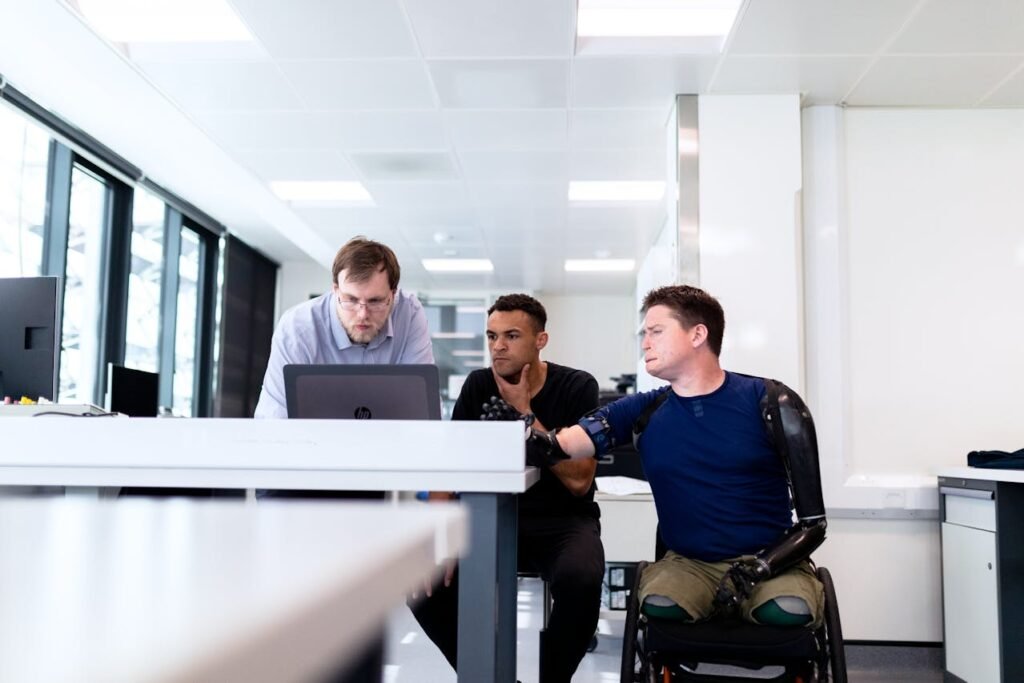Prosthetic technology has advanced rapidly over the past few decades, offering life-changing solutions to individuals who have lost limbs due to accidents, illness, or congenital conditions. From sophisticated bionic limbs to lightweight, durable designs, these devices have the potential to restore mobility, independence, and confidence. Yet, while the technology has evolved, access to prosthetics remains a significant challenge for millions of people around the world.
For those in low-income regions, limited availability, high costs, and inadequate healthcare infrastructure often make prosthetics inaccessible. Even in developed countries, disparities in access persist due to insurance coverage gaps, logistical hurdles, and lack of awareness. Despite these challenges, there are immense opportunities to bridge these gaps and make prosthetic technology universally accessible.
The Current State of Prosthetic Access
Prosthetic technology has made remarkable strides in recent years, but access to these innovations remains uneven across the globe. While some regions boast cutting-edge facilities and advanced prosthetic solutions, others struggle to provide even the most basic devices.
Disparities Between High-Income and Low-Income Regions
In high-income countries, prosthetics are often readily available to those who need them, supported by robust healthcare systems, insurance coverage, and specialized clinics. Users have access to a wide range of devices, from simple mechanical limbs to advanced bionic systems with AI-driven features.
In contrast, low-income regions face significant barriers. Many countries lack the infrastructure needed to produce or distribute prosthetics, forcing individuals to rely on imported devices that are often prohibitively expensive.
Additionally, the scarcity of trained professionals—such as prosthetists and rehabilitation specialists—further limits access, leaving many individuals without the support they need to regain mobility.
For businesses, this disparity highlights an opportunity to develop scalable, cost-effective solutions tailored to underserved markets. By focusing on affordability and local manufacturing, companies can make a meaningful impact while tapping into a vast, untapped demand.
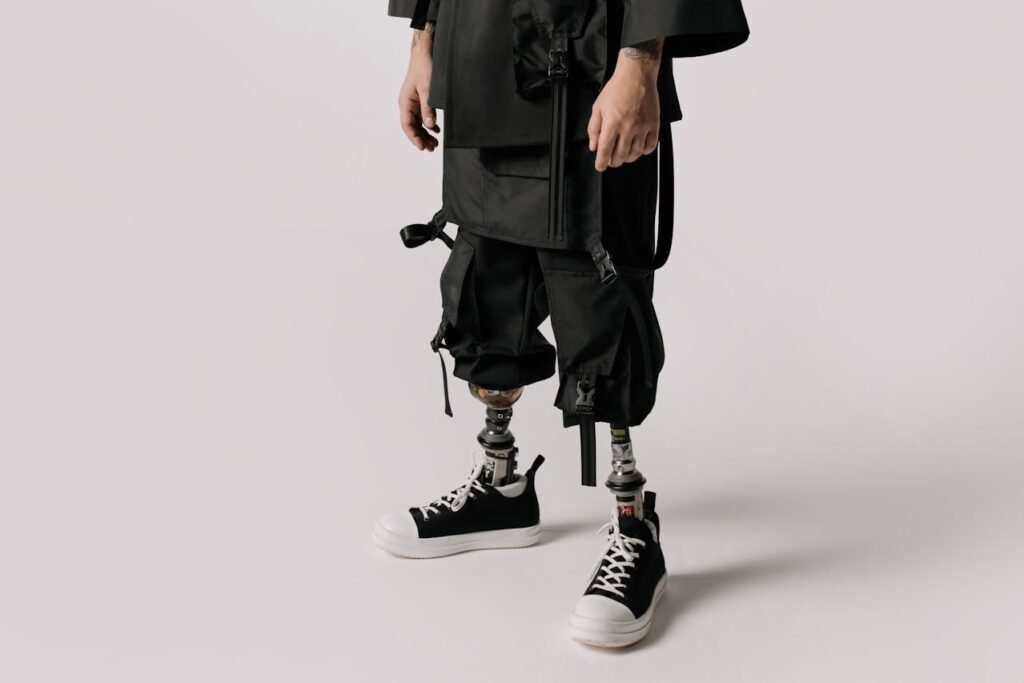
Urban vs. Rural Divide
Even within individual countries, access to prosthetic technology often depends on geographic location. Urban areas typically have better access to specialized clinics, rehabilitation centers, and trained professionals, while rural regions lag behind.
For those living in remote areas, traveling to a prosthetic clinic can be costly and time-consuming, creating additional barriers to care.
This urban-rural divide underscores the need for decentralized solutions, such as mobile clinics, telemedicine services, and community-based initiatives.
Challenges to Global Prosthetic Access
The obstacles to global prosthetic access are multifaceted, involving economic, logistical, and cultural factors. Understanding these challenges is the first step toward addressing them effectively.
Cost Barriers
One of the most significant barriers to prosthetic access is cost. Advanced prosthetics, such as bionic arms and legs, often come with price tags that are out of reach for the average person, particularly in low-income regions. Even basic prosthetics can be expensive when factoring in materials, manufacturing, and fitting services.
For many individuals, the cost of a prosthetic is compounded by ongoing expenses for maintenance, repairs, and replacement parts. Without financial assistance or insurance coverage, these costs can become insurmountable, leaving many without the devices they need.
Businesses can play a crucial role in addressing cost barriers by exploring alternative materials, streamlining production processes, and developing modular designs that allow users to customize their prosthetics based on their budget and needs.

Limited Local Manufacturing
In many parts of the world, prosthetic manufacturing is heavily centralized, with a few companies dominating the global market. This reliance on imported devices creates logistical challenges, including long wait times, high transportation costs, and limited availability of replacement parts.
Local manufacturing offers a potential solution, but it requires investment in infrastructure, technology, and training.
For businesses, establishing local production facilities in underserved regions can reduce costs, improve accessibility, and create jobs, fostering economic development alongside healthcare improvements.
Addressing Logistical and Distribution Challenges
Improving global access to prosthetic technology requires addressing the logistical and distribution challenges that hinder availability in underserved regions. From supply chain inefficiencies to the lack of healthcare infrastructure, these barriers demand innovative solutions and collaborative efforts.
Strengthening Supply Chains
The global distribution of prosthetics is often hampered by fragmented supply chains. Limited coordination between manufacturers, distributors, and local healthcare providers results in delays, shortages, and inflated costs.
These challenges are particularly acute in rural or remote areas, where infrastructure is underdeveloped.
To address these issues, businesses can invest in more resilient and efficient supply chains. This might include partnerships with local distributors, streamlined inventory management systems, or the use of digital platforms to track and optimize shipments.
Additionally, leveraging decentralized manufacturing techniques, such as 3D printing, can reduce reliance on centralized facilities and enable on-demand production closer to the point of care.
Expanding Rural Outreach
The urban-rural divide in prosthetic access is a persistent issue. In many low-income regions, prosthetic clinics and specialists are concentrated in cities, leaving rural populations underserved.
Mobile clinics and outreach programs offer a practical solution. By bringing prosthetic services directly to rural communities, these initiatives reduce the burden of travel and ensure that individuals receive care in their local environment.
For businesses, collaborating with NGOs, government agencies, and community organizations to establish such programs can enhance their social impact while building trust and brand loyalty.
Telemedicine also holds significant potential for rural outreach. Virtual consultations and remote fitting services enable specialists to assist users without requiring in-person visits, making prosthetic care more accessible and cost-effective.
Businesses that integrate telehealth capabilities into their services can reach a broader audience and position themselves as pioneers in innovative care delivery.
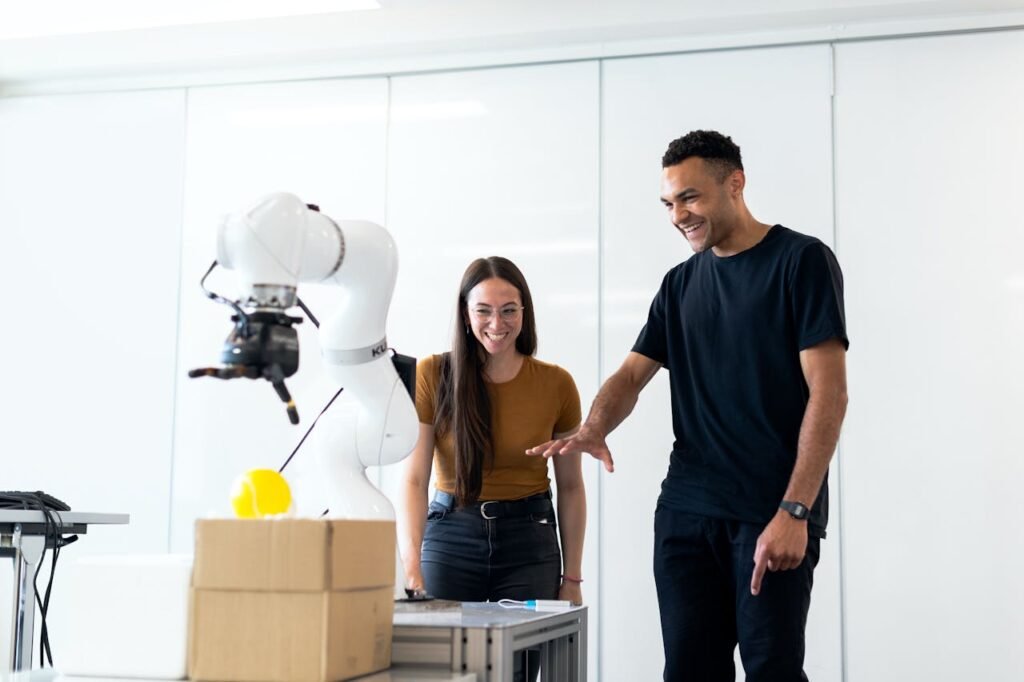
Overcoming Cultural and Awareness Barriers
In addition to economic and logistical challenges, cultural factors and lack of awareness often hinder access to prosthetic technology. Addressing these issues requires sensitivity, education, and collaboration with local communities.
Challenging Stigma and Misconceptions
In some cultures, disabilities are stigmatized, leading to social exclusion and reluctance to seek assistive devices like prosthetics. Misconceptions about prosthetic technology, such as fears of discomfort or doubts about effectiveness, can further discourage adoption.
Businesses can help challenge these stereotypes by sharing success stories that highlight the transformative impact of prosthetics.
Featuring diverse users from various cultural and socioeconomic backgrounds in marketing campaigns and public awareness initiatives can normalize the use of prosthetics and inspire others to take action.
Education is also key. Conducting workshops, demonstrations, and community events can provide valuable information about the benefits of prosthetics, addressing misconceptions and building trust among potential users.
Training Local Professionals
A shortage of trained prosthetists and rehabilitation specialists is a significant barrier to access in many regions. Without skilled professionals to assess, fit, and maintain prosthetics, even the most advanced devices cannot fulfill their potential.
To bridge this gap, businesses can invest in training programs for local healthcare providers. Collaborating with universities, vocational schools, and NGOs to establish certification courses ensures that local communities have the expertise needed to support prosthetic users.
These initiatives not only improve access but also create sustainable employment opportunities, fostering economic growth alongside healthcare improvements.
Opportunities to Expand Access
Despite the challenges, there are immense opportunities to improve global access to prosthetic technology. By leveraging innovation, collaboration, and a user-centered approach, businesses can drive meaningful change while expanding their market reach.
Leveraging Technology for Affordability
Advances in technology, such as 3D printing and AI, have the potential to revolutionize prosthetic manufacturing and reduce costs. 3D printing, for example, enables rapid production of customized prosthetics using affordable materials.
This technology is particularly well-suited to low-income regions, where traditional manufacturing processes may be prohibitively expensive.
AI can further enhance affordability by streamlining design and fitting processes. Machine learning algorithms can analyze user data to create tailored prosthetics with minimal human intervention, reducing labor costs and improving efficiency.
Businesses that adopt these technologies can deliver high-quality prosthetics at a fraction of the traditional cost, making them accessible to a wider audience.
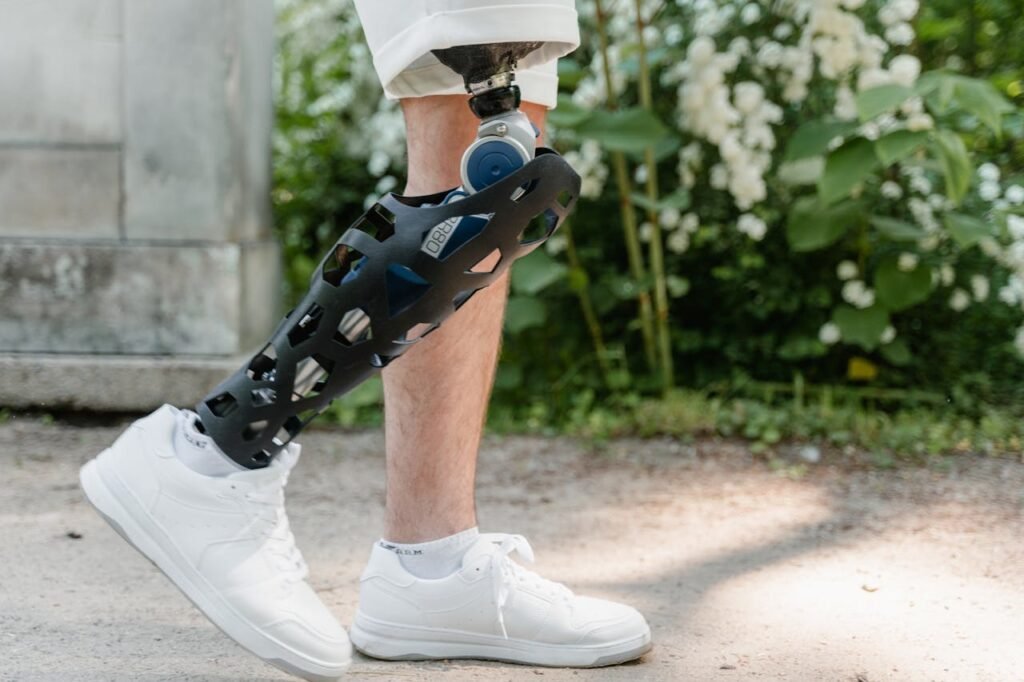
Establishing Public-Private Partnerships
Collaboration between businesses, governments, and non-profits is essential for scaling access to prosthetic technology. Public-private partnerships can pool resources, expertise, and infrastructure to address systemic barriers and deliver sustainable solutions.
For example, governments can provide subsidies or tax incentives for businesses that establish manufacturing facilities in underserved regions, while NGOs can offer logistical support and connect users with services.
Businesses that actively engage in such partnerships demonstrate their commitment to social impact and gain access to funding, networks, and market opportunities.
Promoting Sustainable Solutions for Global Prosthetic Access
Sustainability is critical for ensuring that global prosthetic access is not only expanded but also maintained over the long term. By adopting environmentally friendly practices, investing in local economies, and designing for durability, businesses can create solutions that meet current needs while preparing for the future.
Designing Durable and Modular Prosthetics
Durability is a key factor in ensuring that prosthetics remain accessible and cost-effective for users in low-resource settings. Devices that require frequent repairs or replacements can quickly become a financial burden, particularly in regions where access to maintenance services is limited.
Modular designs offer an innovative solution. By creating prosthetics with interchangeable components, users can replace or upgrade individual parts without needing to purchase an entirely new device. This approach not only reduces long-term costs but also extends the lifespan of the prosthetic, making it more sustainable.
For businesses, modular designs also open the door to customization, allowing users to tailor their devices to their specific needs and preferences. Highlighting these features in product offerings demonstrates a commitment to user-centered design and resource efficiency.
Emphasizing Local Production and Materials
Local production is a powerful way to reduce costs and improve accessibility while fostering economic growth in underserved regions. Establishing manufacturing facilities closer to the point of need reduces transportation expenses, shortens delivery times, and ensures a steady supply of prosthetics.
Using locally sourced materials further enhances sustainability by minimizing the environmental impact of production and supporting local industries. For example, businesses could explore the use of biodegradable plastics or natural fibers to create eco-friendly prosthetics.
Investing in local production also creates jobs and builds skills within the community, contributing to long-term economic development. Businesses that prioritize this approach position themselves as socially responsible leaders while strengthening their relationships with local stakeholders.
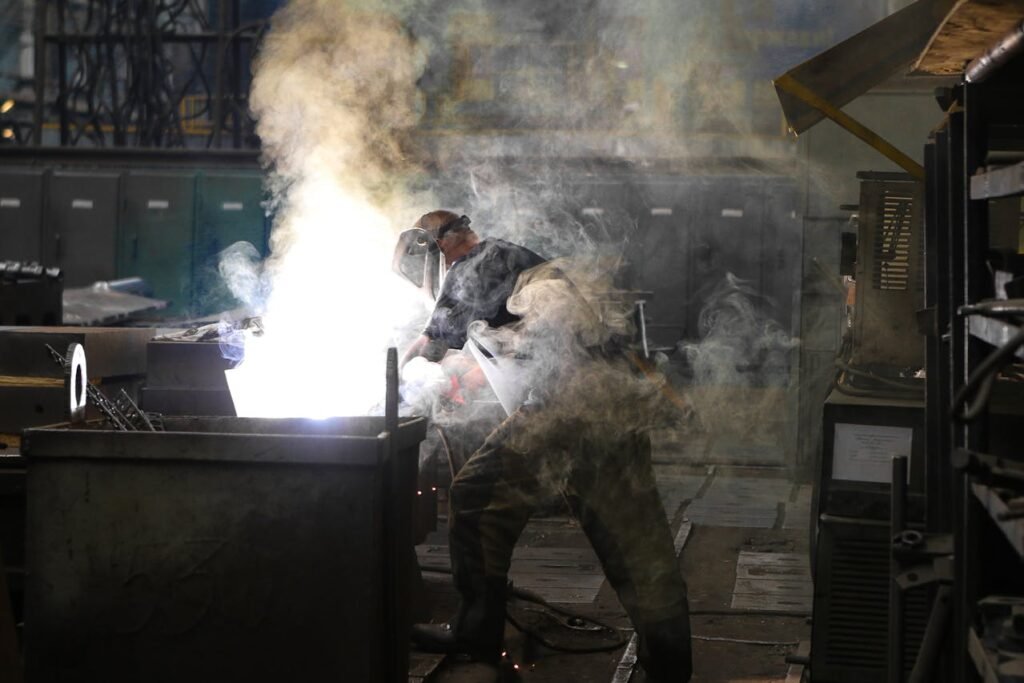
Leveraging Advocacy and Awareness
To achieve widespread access to prosthetic technology, businesses must also focus on advocacy and awareness efforts. Educating stakeholders—from potential users to policymakers—about the importance of prosthetics can drive demand, secure funding, and inspire action.
Engaging Policymakers
Government support is essential for overcoming systemic barriers to prosthetic access. Businesses can advocate for policies that subsidize prosthetic devices, fund research and development, or incentivize local manufacturing.
Engaging with policymakers through roundtables, conferences, and public campaigns ensures that prosthetic access remains a priority on national and international agendas.
Businesses that align their efforts with global initiatives, such as the United Nations’ Sustainable Development Goals (SDGs), can amplify their impact and attract additional support.
Building Community Awareness
Awareness campaigns play a crucial role in reducing stigma, educating potential users, and encouraging community involvement. These campaigns can take the form of workshops, social media initiatives, or partnerships with local influencers who share their experiences with prosthetics.
By humanizing the impact of prosthetic technology, businesses can inspire empathy and action. Sharing stories of users who have regained independence, pursued careers, or achieved athletic milestones with the help of prosthetics creates a compelling narrative that resonates with diverse audiences.
Measuring and Scaling Impact
Expanding global access to prosthetic technology requires not only implementing solutions but also measuring their effectiveness and scaling successful initiatives. Businesses that adopt data-driven approaches can refine their strategies, demonstrate their impact, and attract further investment.
Tracking Outcomes
Collecting and analyzing data on prosthetic use, user satisfaction, and health outcomes is essential for understanding the effectiveness of current efforts.
For example, businesses might track metrics such as the number of devices distributed, the percentage of users reporting improved mobility, or the average cost per device in different regions.
This data can inform decisions about product design, distribution strategies, and pricing models, ensuring that resources are allocated efficiently. Sharing these insights with partners and stakeholders also builds credibility and fosters collaboration.
Scaling Proven Models
Once a successful model for expanding prosthetic access is identified, businesses can work to scale it across regions and demographics.
For instance, a pilot program that combines local manufacturing with mobile clinics could be replicated in other underserved areas, adapting the approach to local conditions.
Scaling requires careful planning and collaboration with partners to address logistical, cultural, and economic differences.
Businesses that demonstrate the ability to adapt and replicate their solutions position themselves as leaders in the field, capable of making a lasting global impact.

The Role of Innovation in Shaping the Future
Innovation lies at the heart of addressing the challenges and opportunities in global prosthetic access. By rethinking traditional approaches and embracing new technologies, businesses can create solutions that are not only effective but also scalable and inclusive.
Exploring Advanced Manufacturing Techniques
The use of advanced manufacturing techniques such as 3D printing and robotics has the potential to revolutionize prosthetic production. These methods enable faster, more cost-effective manufacturing while maintaining a high degree of customization.
For example, 3D printing allows prosthetic components to be produced on-demand, reducing inventory requirements and eliminating delays caused by supply chain disruptions. It also enables the creation of bespoke designs tailored to the specific needs of each user, ensuring a better fit and improved functionality.
Businesses that invest in advanced manufacturing can position themselves as leaders in innovation, offering high-quality prosthetics at a fraction of the traditional cost. This approach is particularly beneficial for low-income regions, where affordability is a critical factor in accessibility.
Integrating AI and Data Analytics
Artificial intelligence (AI) and data analytics are transforming how prosthetics are designed, fitted, and maintained. By leveraging AI algorithms, businesses can analyze user data to optimize prosthetic designs, predict maintenance needs, and provide personalized recommendations.
For instance, AI-driven software could analyze gait patterns to identify areas where a prosthetic leg needs adjustment, enhancing comfort and performance. Similarly, predictive analytics could alert users when their device requires servicing, reducing downtime and improving reliability.
Integrating AI into prosthetic technology not only enhances user experience but also provides valuable insights for manufacturers. These insights can inform product development, refine distribution strategies, and identify opportunities for growth.
Advancing Sustainability in Prosthetic Design
Sustainability is becoming an increasingly important consideration in prosthetic manufacturing. By adopting environmentally friendly materials and processes, businesses can reduce their ecological footprint while addressing the growing demand for sustainable products.
For example, biodegradable plastics and recycled materials can be used to create lightweight, durable prosthetics that minimize waste. Additionally, energy-efficient manufacturing processes reduce the environmental impact of production.
Businesses that prioritize sustainability appeal to eco-conscious consumers and align themselves with global efforts to combat climate change. Highlighting these efforts in branding and communication reinforces a commitment to ethical and responsible practices.
The Path Forward
Expanding global access to prosthetic technology is not just about addressing immediate needs—it’s about creating a future where no one is left behind. By combining innovation with collaboration and inclusivity, businesses can drive meaningful change that transforms lives and communities.
Building Stronger Partnerships
Collaboration is essential for tackling the multifaceted challenges of global prosthetic access. By partnering with governments, non-profits, and local organizations, businesses can pool resources and expertise to deliver sustainable solutions.
These partnerships can take many forms, from co-developing affordable prosthetics to establishing community-based distribution networks. By working together, stakeholders can address systemic barriers and ensure that prosthetic technology reaches those who need it most.
Empowering Users
At the center of any effort to expand prosthetic access are the users themselves. Empowering individuals with the knowledge, tools, and support they need to thrive ensures that prosthetics are not just devices but enablers of independence and opportunity.
Businesses can contribute by providing educational resources, offering training programs, and fostering communities where users can share experiences and insights. This user-first approach builds trust and ensures that prosthetic technology is truly transformative.
Conclusion
Global access to prosthetic technology remains a pressing challenge, but it is one that can be overcome with innovation, collaboration, and determination. By addressing barriers such as cost, distribution, and awareness, businesses have the opportunity to create a more inclusive and equitable future.
The journey toward universal prosthetic access is not just about technology—it’s about human resilience, creativity, and the desire to make a difference. For businesses, it’s a chance to lead with purpose, creating solutions that restore mobility, empower individuals, and inspire hope.
With the right strategies and partnerships, the vision of accessible prosthetic technology for all can become a reality. It’s a future worth striving for, where everyone has the tools they need to move forward—both literally and figuratively—toward a brighter tomorrow.



